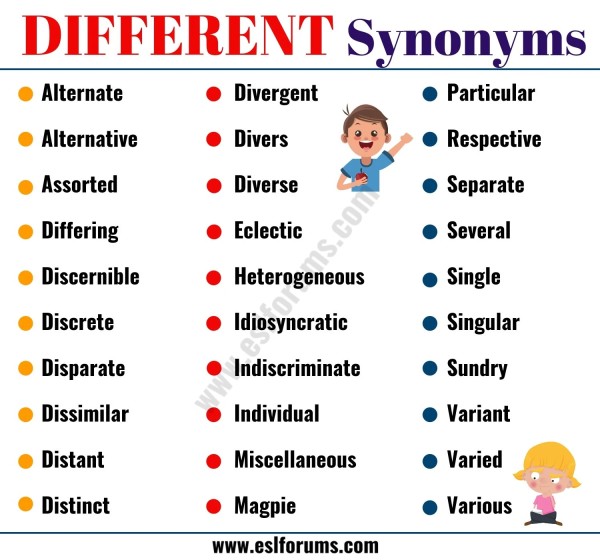The word “different” is used every day to describe things that are not the same. But English offers many other words to express this idea more precisely — like distinct, diverse, dissimilar, or unusual. Learning these synonyms helps you enrich your vocabulary, avoid repetition, and make your speaking and writing more natural and expressive.
Why Use Synonyms for “Different”?

Avoid repetition: Instead of saying “different” many times, you can vary your wording to make your writing or speech more interesting.
Convey nuance: Some synonyms highlight variation, others emphasise contrast, or separateness. For example, “diverse” suggests variety, while “disparate” suggests a big gap or contrast.
Suit the tone: Some words are more formal or academic (e.g., distinctive, disparate), others more everyday (e.g., unlike, other).
Examples of Synonyms & Their Usage
Here are some good alternatives to “different” with notes on when and how to use them:
Distinct – Emphasises something clearly separate or recognisably different.
Example: Each cuisine has distinct flavours and spices. (instead of “different flavours”)
Dissimilar – Suggests two or more things are not alike.
Example: The two proposals are dissimilar in many respects.
Unlike – More informal; emphasises contrast between two things.
Example: His reaction was unlike anything I’d seen before.
Diverse – Suggests many kinds, variety, or a wide range.
Example: She has diverse interests from painting to hiking.
Disparate – More formal; emphasises things being so different that comparison is difficult.
Example: The project brought together disparate groups with very different goals.
Divergent – Suggests movement away from a common point; more precise than “different”.
Example: They took divergent paths after graduation.
Unusual / Peculiar – When “different” means strange or not the norm.
Example: It was a peculiar situation, unlike anything he’d expected.
How to Choose the Right Word
If you mean simply “not identical”, then “different”, “dissimilar”, or “unlike” work fine.
If you emphasise variety, use “diverse”.
If you emphasise contrast or disparity, use “disparate” or “divergent”.
If you mean strange or out of the ordinary, use “peculiar” or “unusual”.
Check collocations (which words naturally go together). For example, “diverse interests”, “distinct features”, “disparate systems”.
Sample Sentences
The artists come from diverse backgrounds and bring unique styles.
His opinions were distinctly different from the others in the meeting.
The two versions of the software are dissimilar in many technical details.
Their goals are so disparate that collaboration seems unlikely.
She wore a dress that looked peculiar in that elegant setting.
The siblings followed divergent careers: one became an engineer, the other a musician.
The climate conditions in the north and south are unlike each other significantly.
Learn 40 synonyms for DIFFERENT in English to expand your synonyms dictionary.
Dissimilar Multifarious Particular Various Several Magpie Distant Divergent Divers Kitchen-sink Peculiar Respective Motley Heterogeneous Idiosyncratic Indiscriminate Individual Mixed Separate Single Disparate Miscellaneous Diverse Eclectic Singular Manifold Assorted Alternate Sundry Variant Varied Distinct Differing Discernible Discrete Piebald Promiscuous Raggle-taggle Ragtag Alternative
